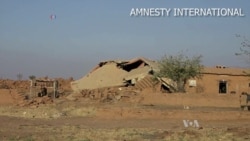Kurdish forces in northern Syria, one of the few armed groups in the multilayered civil war trusted by the U.S.-led coalition to battle Islamic State extremists, are said to have carried out forced displacement of Arabs and Turkmen and mass house demolitions of villages in territory they have captured.
Amnesty International said the Popular Protection Units, the YPG, an offshoot of Turkey’s outlawed Kurdistan Workers’ Party, the PKK, razed entire villages captured from Islamic State forces in retaliation either for perceived sympathies with the jihadist group or as punishment for past grievances and old land disputes.
The report, We Had Nowhere Else To Go, comes a day after American officials said the U.S. had dropped 50 tons of arms and ammunition to rebels in northern Syria.
The YPG is believed to have been among the beneficiaries of the airdrop.
Kurd response dismissed
Amnesty dismisses claims by Kurdish authorities the forced displacement was necessary on military grounds, saying its investigators in an on-the-ground fact-finding mission to 14 villages in al-Hasakeh and al-Raqqa governorates found no such justification.
Citing eyewitness accounts and satellite imagery, the report said Kurdish groups in the fight against Islamic State militants "appear to be trampling all over the rights of civilians who are caught in the middle.”
“We saw extensive displacement and destruction that did not occur as a result of fighting. This report uncovers clear evidence of a deliberate, coordinated campaign of collective punishment of civilians in villages previously captured by IS or where a small minority were suspected of supporting the group,” said Lama Fakih, an Amnesty adviser.
Satellite imagery of Husseiniya village, in the Tel Hamees countryside, shows 225 buildings standing in June 2014, but only 14 remaining a year later, the rights group said.
'Isolated incidents'
The YPG has admitted to some “isolated incidents" of forcing Arabs out of their homes in villages captured by Syrian Kurdish forces.
In July, PYD leader Salih Muslim told CNN, “Some circles are trying to ignite a Kurdish-Arab military conflict.” During the interview, he denied allegations his forces have been engaging in the forced displacement of Arabs.
The U.S. government has not publicly commented on Amnesty’s allegations, but one Turkey-based American official said Washington started months ago to press YPG leaders not to take advantage of their military advances, backed by U.S.-led airstrikes against the Islamic State group, for a land-grab.
“We will just push them much harder and demand a clearer explanation,” the official told VOA.
In June, the Turkish government, as VOA reported, conveyed its concerns about the YPG and its associated Syrian Kurdish Democratic Union Party, the PYD, seeking demographic changes or population shifts on the Syrian side of the border as a result of Kurdish military offensives against jihadists.
U.S. Secretary of State John Kerry has said he understands Ankara’s concerns. But, he added, during the prolonged battle for the northern Syrian Kurdish border town of Kobani, “it would be irresponsible of us, as well as morally very difficult, to turn your back on a community fighting IS as hard as it is."
On Sunday, in an interview with CBS’s 60 Minutes, U.S. President Barack Obama acknowledged the challenges the West is facing in Syria in its efforts to battle Islamic State extremists and find a solution to a four-year-long civil war that has left 250,000 people dead.
One of the challenges, Obama said, has been trying to find a way to “moderate opposition on the ground.”
Rights violations accusations
This isn’t the first time the Kurdish group has been accused of serious human rights violations, and fears have been mounting since mid-2014 that it is determined to alter the demographic map to further its aim to enlarge its territory and create an autonomous state in northern Syria.
In June 2014, Human Rights Watch accused the YPG of recruiting child soldiers, detaining arbitrarily those who oppose its authority, and failing to address unsolved killings and disappearances.
The Kurds pledged then not to use children under the age of 18 to fight. But subsequent probes by rights groups have found that commitment regularly broken.
This week, Russia Today broadcast a YPG-assisted documentary focused on women Kurdish fighters and interviewed at least one 16-year-old recruit.
Since mounting a military intervention in Syria, Moscow has been courting the YPG and PYD and Russia Today has been broadcasting laudatory commentary on the group.





